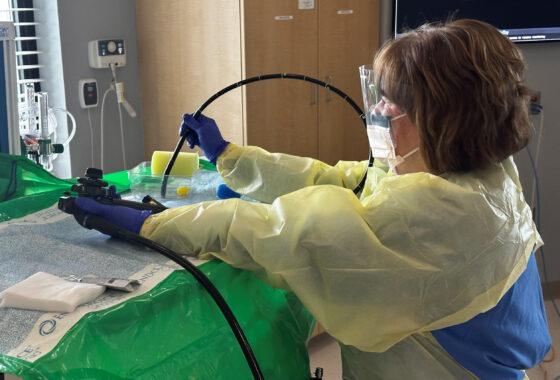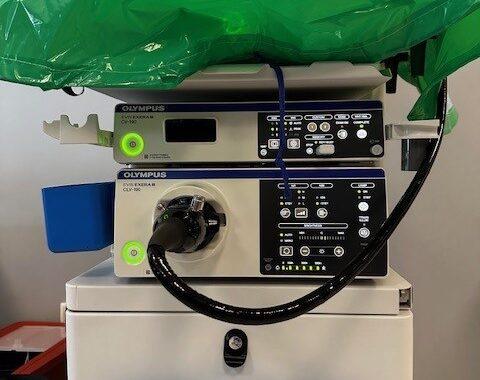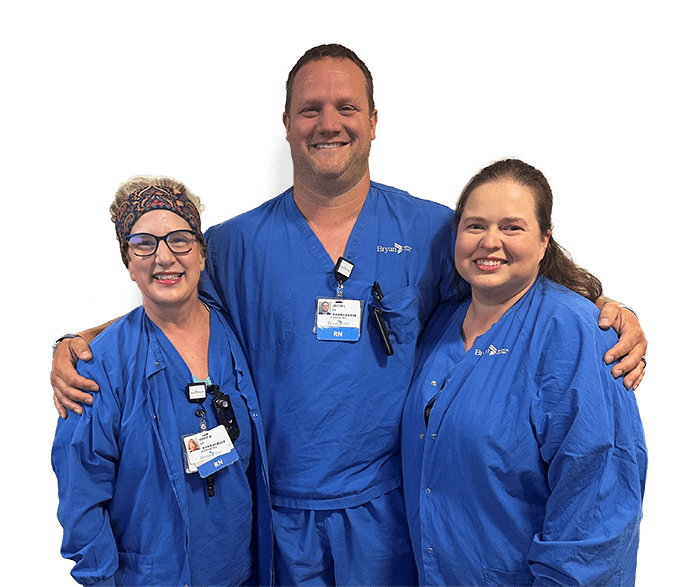

Procedure Prep Instructions
Diet medications such as phentermine need to be held
Ask your doctor about your medications if you’re unsure.
Stop taking these meds:
- Byetta
- Dulaglutide
- Liraglutide
- Monjaro
- Ozempic
- Saxenda
- Semaglutide
- Tirzepatide
- Trulicity
- Victoza
- Wegovy
- Zepbound
Blood-thinning medications may need to be held.
You will receive specific instructions.
Anti-inflammatory meds need to be held. (Celebrex, ibuprofen, naproxen)
Over-the-counter vitamins and supplements need to be held, including fish oil and iron.
No flax seeds, chia seeds, or foods with small seeds
Ask your doctor about your medications if you’re unsure.
Stop taking these meds:
- Adipex
- Aggrenox
- Atti-Plex
- Brilinta
- Cilostazol
- Coumadin
- Clopidogrel
- Effient
- Fastin
- Lomaira
- OraVerse
- Osymia
- Phentermine
- Plavix
- Pletal
- And More.
Blood-thinning medications may need to be held.
You will receive specific instructions.
Anti-inflammatory meds need to be held. (Celebrex, ibuprofen, naproxen)
Over-the-counter vitamins and supplements need to be held, including fish oil and iron.
No flax seeds, chia seeds, or foods with small seeds
Ask your doctor about your medications if you’re unsure.
Stop taking these meds:
- Ertugliflozin
- Segluromet
- Steglujan
- Steglatro
- Bexagliflozin
- Brenzavvy
- Canagliflozin
- Invokana
- Dapagliflozin
- Edistride
- Ebymect
- Empagliflozin
- Forxiga
- Flyxambi
- Glyxambi
- And More.
Blood-thinning medications may need to be held.
You will receive specific instructions.
Anti-inflammatory meds need to be held. (Celebrex, ibuprofen, naproxen)
Over-the-counter vitamins and supplements need to be held, including fish oil and iron.
No flax seeds, chia seeds, or foods with small seeds
Ask your doctor about your medications if you’re unsure.
Stop taking these meds:
- Contrave
- Naltrexone
- Anti-diarrhea meds
Blood-thinning medications may need to be held.
You will receive specific instructions.
Anti-inflammatory meds need to be held. (Celebrex, ibuprofen, naproxen)
Over-the-counter vitamins and supplements need to be held, including fish oil and iron.
No flax seeds, chia seeds, or foods with small seeds
Ask your doctor about your medications if you’re unsure.
Stop taking these meds:
- Apixaban
- Eliquis
- Pradaxa
- Xarelto
CLEAR LIQUIDS ONLY FOR THE ENTIRE DAY! DO NOT EAT TODAY!
Do not take diuretics/water pills.
Do not take Rybelsus.
1st dose of prep at 5PM.
CONTINUE CLEAR LIQUIDS.
2ND dose of prep 4hrs before leaving your house.
Do NOT drink anything after completing your prep.
NO oral diabetic meds. Ok for 1/2 dose of insulin, hold all other injectable diabetic medications
OK to take BP meds, asthma/respiratory meds, seizure meds, Parkinson’s meds, and steroids with sips of water at least 2 HOURS before you check in.
Clear liquids = water, juice without pulp, sports drinks, Jello, popsicles, sodas, soup broth, tea, black coffee (sugar ok, NO creamer).
- NO red dyes (red, dark blue, or dark purple colors)
- NO milk or dairy products
- NO alcohol
Bring a driver with you. NO public transportation, Lyft, or Uber.
FOR YOUR SAFETY, FAILURE TO FOLLOW THESE INSTRUCTIONS MAY RESULT IN YOUR PROCEDURE BEING CANCELLED.
Colonoscopy FAQ
Why is Bowel Prep Important?
Your bowel must be clean so that your doctor can thoroughly examine your colon. Many patients feel that the bowel prep is the most difficult part of a colonoscopy. But it is important that you try your best to fully complete the prep.
It is extremely important that your colon be thoroughly cleaned before your colonoscopy. This will let the doctor see any abnormalities, such as colon polyps, during the procedure. Polyps are small growths in the colon that could later turn into cancer. Cleansing the colon before a colonoscopy is called bowel preparation, or “prep”.
What Are The Types of Bowel Prep?
Several types of bowel prep medications are available. Your physician will recommend the prep that is the best fit for you. Your medical condition is the most important factor in deciding which type of bowel prep is best for you. Tell your doctor if you are pregnant or breastfeeding, or if you have a history of bowel obstruction. Let the doctor know if you have high blood pressure. Also, mention if you have any heart, kidney, or liver disease, or if you have had any of these diseases in the past. You need to mention any allergies you have to medications to the doctor. If you have had difficulty with a bowel prep in the past, be sure to mention this as well. Other factors in choosing the type of prep are the time of the colonoscopy appointment, individual preferences (taste and amount of medication), and out-of-pocket costs.
You will need to carefully follow your doctor’s instructions about the exact dose and timing of your prep. Some types of prep may be covered by your medical insurance. You’ll want to find out if you have any out-of-pocket costs.
What Preparation Steps Are Involved?
Your doctor will prescribe the type of bowel prep that is best for you. You will receive specific instructions. In general, here is what you can expect:
- Your doctor will tell you to change your diet at least one day before your colonoscopy. Usually, you will need to limit your diet to clear broth, tea, gelatin desserts, ginger ale, sherbet, and clear fruit juices (the ones you can see through), such as apple juice.
- You need to avoid gelatin desserts and liquids that are red, dark blue, or purple.
- It is important to avoid dehydration during bowel prep. Drink more fluids than you usually do.
- Your doctor will tell you exactly when to stop eating and drinking before your
- Follow carefully all the steps your doctor prescribes. Tell your doctor what medications you’re taking, especially aspirin products, arthritis medications, anticoagulants (blood thinners such as warfarin or heparin), clopidogrel, insulin or iron products. Most medications can be continued. Some can interfere with either the prep or the colonoscopy.
Can I Take My Current Medications?
Tell your doctor what medications you’re taking, especially aspirin products, arthritis medications, anticoagulants (blood thinners such as warfarin or heparin), clopidogrel, insulin, or iron products. Most medications can be continued. Some can interfere with either the prep or the colonoscopy.
Alert your doctor if you require antibiotics before dental procedures, because you might need antibiotics before a colonoscopy as well.
What Are Polyps and Why Are They Removed?
Polyps are small growths that can be formed on the lining of the colon. While most polyps are noncancerous (benign), some can develop into colorectal cancer over time if left untreated. During a colonoscopy, if polyps are found, your doctor will typically remove them right away. This process, called a polypectomy, is quick and painless. Removing polyps helps prevent cancer and allows them to be tested to determine if any are precancerous or require further monitoring.
What if The Colonoscopy Shows Something Abnormal?
If your doctor thinks an area needs further evaluation, he or she might pass an instrument through the colonoscope to obtain a biopsy (a sample of the colon lining) to be analyzed. Biopsies are used to identify many conditions, and your doctor might order one even if he or she doesn’t suspect cancer. If a colonoscopy is being performed to identify sites of bleeding, your doctor might control the bleeding through the colonoscope by injecting medications or by coagulation (sealing off bleeding vessels with heat treatment). Your doctor might also find polyps during a colonoscopy, and he or she will most likely remove them during the examination. These procedures don’t usually cause any pain.
What Happens After a Colonoscopy?
Your physician will explain the results of the examination to you, although it typically takes 7-10 days for the results of any biopsies or pathology performed.
If you have been given sedatives during the procedure, someone must drive you home and stay with you. Even if you feel alert after the procedure, your judgment and reflexes could be impaired for the rest of the day. No public transportation. No driving or alcohol for the remainder of the day. You might have some cramping or bloating because of the air introduced into the colon during the examination. This should disappear quickly when you pass gas.
You should be able to eat after the examination, but your doctor might restrict your diet and activities, especially after polypectomy.
What Are The Possible Complications of Colonoscopy?
Colonoscopy is generally a very safe procedure, but like any medical test, there are some potential risks. These complications are rare but may include bleeding, perforation, reaction to sedation, infection, or discomfort.
Your care team takes every precaution to minimize these risks and ensure your safety. Your doctor will discuss any concerns with you before the procedure.
